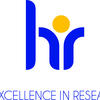Research Fellowship Schemes and Grant Funding
The School of Archaeology welcomes applications from researchers seeking to apply for Research Fellowships or Grants. To ensure that proposals are competitive and appropriately supported, all applications must go through our internal review process before submission to a funder.
Please note:
-
The School does not itself offer funded fellowships. Some Oxford colleges advertise funded (stipendary) Junior Research Fellowships (JRFs) separately via their websites, the Oxford Gazette, and the Conference of Colleges website.
-
Our internal deadlines are earlier than funder deadlines to allow time for review, feedback, budget preparation, and institutional approvals.
Application Process
Please note that this is a general description of the process and specific calls may be different to account for specific requirements of that funder and/or program.
- Initial Contact
Applicants should first contact a potential supervisor (see our list of Academic and Senior Research Staff) to discuss their project.
- Expressions of Interest (EOI)
Submit an EOI via the webform links provided on this page when a call is open. For funders with rolling deadlines (e.g. AHRC), please email your EOI to research@arch.ox.ac.ukAn Expression of Interest should include
- Academic CV
- One-page project proposal outlining the research aims, methods, outputs, and estimated costs (e.g. fieldwork or laboratory analyses). Please see the radiocarbon and isotope lab webpages for current costs. Note: some stipend-based fellowships require the School to charge an administration fee and monthly bench fee. For some calls, you may have a slightly longer EOI limit to enable additional detail to be included. Remember that call-specific guidance will always take precedence over this description for general and ad-hoc applications. Always refer to the call specific page if you are applying to a major fellowship or grant call.
- Letter of support from a proposed supervisor. This should explain their relationship to the applicant, the links between their research and the proposal, and the mutual benefit of hosting the project within the School. For grant calls where the applicant would be PI, a letter of support from a School colleague (rather than a supervisor) is acceptable.
- Full Application
Supported applicants will be invited to prepare a full draft application for internal review 2–6 weeks before the deadline.
- Submission
All applications are then submitted through the University of Oxford Central Research Service office who check eligibility, finances, and issue final approval. In some instances, they may submit the application through the funder application portal on behalf of the applicant.
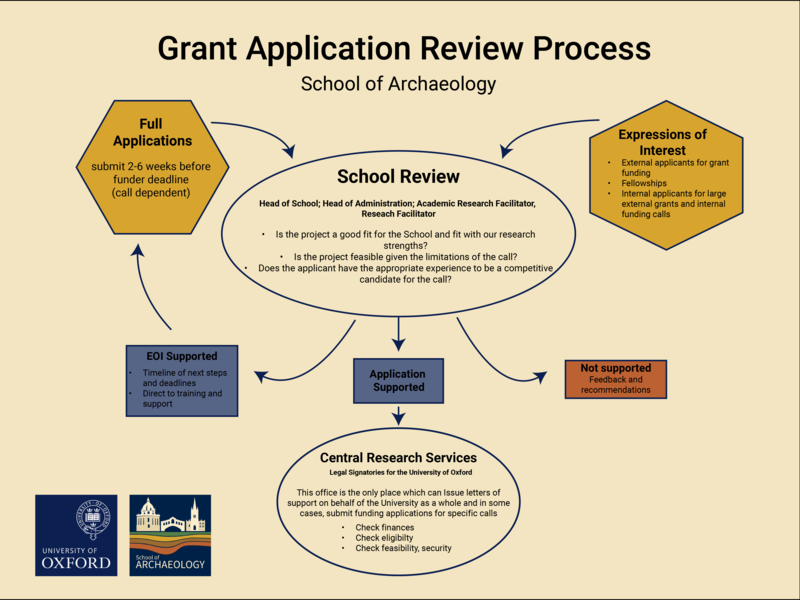
Expressions of Interest: Research Fellowship Schemes
We are now accepting Expressions of Interest (EOIs) for the following two fellowship schemes:
British Academy International Fellowships (BAIF)
Royal Society Newton Fellowships
Please note that separate EOI processes and forms now apply to each scheme, due to University-level internal demand management requirements for BAIF.
British Academy International Fellowships (BAIF)
BAIF Expression of Interest form
-
Opens: 22 January 2026
-
Closes: noon (12:00 pm) on 29 January 2026
The British Academy International Fellowship scheme is subject to internal demand management at the University of Oxford. As a result, the School of Archaeology must conduct an earlier internal selection process.
EOIs submitted to the School will be reviewed on 30 January 2026, and applicants will be notified of the outcome by the end of the day on 30 January.
Applicants selected for School support should note that the University now requires full applications for internal demand management to be submitted by noon on 13 February 2026. This means that successful candidates will have approximately two weeks to develop and complete their full application following confirmation of support.
Royal Society Newton Fellowships
Royal Society Newton Fellowships Expression of Interest Form
-
Opens: 22 January 2026
-
Closes: 23:59 on 5 February 2026
Royal Society Newton Fellowships are not currently subject to University-level demand management.
The School will review all EOIs and notify applicants of the outcome by 12 February 2026. Selected candidates will then proceed through the School’s internal review process to support the development of their full application. Applicants should expect to have a completed application ready for submission by the final week of February 2026.
Further Information
For details on what to include in your Expression of Interest, please see the “Information for Applicants” tab here:
https://www.arch.ox.ac.uk/research-fellowships
If you have any queries or experience any issues using the forms, please contact the Research Support Team at research@arch.ox.ac.uk.
The School of Archaeology welcomes researchers from all backgrounds, and provides a vibrant environment in which to undertake postdoctoral research. The School has a track record of hosting successful Research Fellowships (please see the list of current and recent Fellows above), and provides an excellent range of facilities, including laboratories and research space. The School has close links with the Ashmolean Museum of Art and Archaeology and the Pitt Rivers Museum; and the University’s Bodleian Library resources are world-renowned.
School of Archaeology support and resources for Research Fellows
- The provision of mentors or supervisors is an integral element of the Fellowship schemes, and these roles are fulfilled by academic staff within the School. Annual Career Development Reviews are offered to all fixed term researchers in the School. In addition, the Head of School holds an individual meeting with each Research Fellow each year to discuss project and career progress.
- The School has a broad range of laboratory facilities, most of which are based at the Research Laboratory for Archaeology and the History of Art (RLAHA), which can be utilised by Fellows (please note that this must be built into Fellowship applications through discussion with the relevant School staff). Facilities include stable isotope, radiocarbon, genetic, geochemical, and physical material analyses.
- The School’s Research Facilitator provides regular updates on grant application opportunities for all researchers, as well as one-to-one support in drawing together applications, and circulates information regarding upcoming training opportunities offered within the University.
- The School hosts a wide range of seminar series, involving internal and external speakers. Information on their current programmes is available here.
- SPECTRA (Society for Postdoctoral and Early Career Teaching and Research Staff in Archaeology) is the official society of the postdoctoral researchers within the School. It exists to facilitate networking between its members, represent the postdoctoral community at appropriate School committees, and promote the professional development of early career researchers. The Society’s website is available here.
- Teaching opportunities can be offered, according to where Fellows are best able to contribute. There is the potential to work with the taught course elements of the BA in Archaeology & Anthropology (a full list of the undergraduate courses is available here). There may also be opportunities for specialist tuition through undergraduate and postgraduate taught-course dissertation supervision; a full list of our postgraduate taught degrees can be found here.
University support and resources for Research Fellows
The following University resources are available for the School's community of fixed term researchers and colleagues working with them. If you have any queries relating to the guidance or the opportunities set out below, please contact the School at research@arch.ox.ac.uk.
University Code of Practice for the Employment and Career Development of Research Staff
The University's Code of Practice is available as a pdf document via this link. The website includes Guidance for Researchers regarding career development, with a checklist of questions that may be useful to consider at different stages within the research contract, and Guidance for PIs, research group leaders, Heads of Department and Departmental Administrators working with research staff.

Support for Researchers
The University website's Support for Researchers section includes information on:
- The Researcher Development Concordat (an agreement between employers of researchers and research funders on the expectations for the professional development and employment conditions of researchers in the UK);
- The University's Research Staff Hub
Guidance on Personal Development Reviews (PDRs), Career Development Reviews (CDRs) and DIY Personal Development is available via the People & Organisational Development team.
A range of training opportunities relating to career development (within and beyond academia) can be found at:
Guidance relating specifically to teaching and supervision opportunities is also provided at this link.

Applying for grants
Information about current archaeology-related funding opportunities is available on the School's internal Research Support webpage. More general guidance on research funding is available on the University website.
Funding can be sought internally (i.e. from sources within the University) or externally (such as the UK Research Councils, ERC or charities).
Researchers interested in applying to any external or internal research grant scheme must first obtain School approval. Queries regarding potential funding applications should be sent in the first instance to the School's Research Facilitator.

Oxford Research Staff Society
The University’s Oxford Research Staff Society is a forum for researchers throughout the University, which represents researchers within and beyond the University, and organises social and professional networking activities across departments and divisions. There are representatives from the School of Archaeology on the Committee. Every term the University also runs a welcome event for new researchers (more information is available here).
The School of Archaeology is keen to attract and support high-quality early career research. Over the past six years (2018 to the present), the School has hosted six British Academy Postdoctoral Fellows, six Leverhulme Early Career Fellows, eight Marie Skłodowska-Curie Fellows and two Newton International Fellows, as listed below.
These Fellowships have covered a broad range of subject areas, including human evolution, palaeoclimate and palaeoecology, ancient and medieval economies, material culture innovation, social inequalities, and modern migrations. Fellows have gone on to pursue further research careers both within the School and at a variety of international institutions.
BRITISH ACADEMY POSTDOCTORAL FELLOWS:
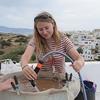
Dr Charlotte Diffey is a current Fellow, researching 'Plants and Power: The Social Dynamics of Urban Food Production at the Late Bronze Age City of Hattusha', with Prof. Amy Bogaard as mentor.

Dr Huw Groucutt conducted research on 'The Cultural Dimension of Neanderthal-Homo Sapiens Admixture at the Gateway to Eurasia', from 2016 to 2019, with Prof. Michael Petraglia as mentor. He went on to become a research group leader at the Max Planck Institute for Chemical Ecology, on the project Extreme Events in Biological, Societal and Earth Systems.

Dr Rachael Kiddey conducted research on 'Migrant Materialities: The Material Culture of Forced and Undocumented Migrants in Europe', with Dr Lambros Malafouris as mentor, from 2018 to 2022. Following this project, she went on to a Teaching Associate post in Heritage Studies at the Department of Archaeology, University of Cambridge.

Dr Samantha Neil conducted the research project 'Reconstructing Lifeways During the Mesolithic and Neolithic in North-west France', with Prof. Rick Schulting as mentor, from 2020 to 2023.

Dr Shyama Vermeersch is a current Fellow, researching 'Farming and the rise of wealth inequality in the southern Levant during the Bronze (3,600-1,550 BCE) and Iron Ages (1,550-332 BCE)', with Dr Amy Styring as mentor.

Dr Jade Whitlam's research project, 'Farming before Agriculture: Investigating Variability in Plant Management and Consumption by Western Asia’s Earliest Cultivators', was undertaken from 2018 to 2021 with Prof. Amy Bogaard and Prof. Mike Charles as mentors. Jade went on to a Departmental Lectureship post in the School of Archaeology, University of Oxford.
LEVERHULME EARLY CAREER FELLOWS:

Dr Paul Albert conducted the research project 'Lake Suigetsu and Volcanic Ash, The Key to Synchronising Palaeoclimate Archives', from 2015 to 2018, with Prof. Victoria Smith as mentor. He was then awarded a Future Leaders Fellowship at Swansea University College of Science, studying volcanic ash deposits in marine sediments to improve predictions of future eruptions and their impact.

Dr Lorena Becerra-Valdivia won a Fellowship to research 'The Role of Abrupt Climatic Shifts in the Initial Settlement of South America', with Prof. Christopher Bronk Ramsey as mentor. Lorena moved to the University of Bristol's Department of Anthropology and Archaeology as a Senior Research Associate in 2024.

Dr Tom Brughmans conducted research on 'MERCURY: Simulating the Roman Economy', from 2017 to 2019, with Prof. Andrew Wilson as mentor. He went on to a Marie-Skłodowska-Curie Fellowship at the Faculty of Physics of the University of Barcelona, developing innovative network science methods for archaeological research in general and for the study of the Roman economy specifically.

Dr Jane Kershaw’s research project on 'Britain’s Viking Silver Hoards: An Archaeological Analysis of the Sources and Uses of Silver in Scandinavian Britain (850–1050 AD)', was undertaken from 2017 to 2019, with Prof. Helena Hamerow as mentor. She went on to become Principal Investigator on an ERC Starting Grant at the School of Archaeology in Oxford, with the project Silver and the Origins of the Viking Age.

Dr Danielle McLean carried out a research project on 'Volcanic Ash for Synchronising Archaeological and Climate Records in Northwest Africa' from 2021 to 2024, with Prof. Victoria Smith as mentor. She went on to hold an AHRC Catalyst Award at the School, from 2024 to 2026.
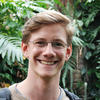
Dr Alexander Weide conducted research on 'Co-Evolution of Social and Agricultural Practices at the Dawn of Farming' from 2021 to 2024, with Prof. Amy Bogaard as mentor. He went on to become Assistant Professor in Environmental Archaeology at the Department of Archaeology, University of Cambridge.
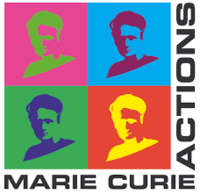
MARIE SKŁODOWSKA-CURIE FELLOWS:

Dr Cecilia Dal Zovo is a current Fellow. Her project is 'TRAILS: Tracing Rock Art, Embedded Landscapes of Movement, and Cosmovisions in the Gobi Altai Mountains (Mongolia)', with Prof. Chris Gosden as mentor.

Dr Carolyne Douché conducted research on the project 'GRAMADIF: Do grains make the difference? Plant economies during the development of urban societies in Mesopotamia' from 2022 to 2024, with Prof. Mike Charles as mentor. Carolyne will take up post as a Researcher Coinvestigator on a John Fell Fund grant at the School in 2024-25.

Dr Tanya Dzhanfezova conducted the research project 'Mapping Intentionality: Demonstrating Innovation in Neolithic Pottery Uptake in the Eastern Balkans' from 2018 to 2021, with Mr Chris Doherty and Prof. Amy Bogaard as mentors. She went on to be Associate Professor in Neolithic and Bronze Age Archaeology at St Cyril and St Methodius University of Veliko Tarnovo, Bulgaria.
Dr Juanjo García-Granero conducted the research project 'An Innovative Approach for the Study of Culinary Practices in Past Societies (CUISINE)', from 2017 to 2019, with Prof. Amy Bogaard as mentor. He then commenced a 3-year 'Juan de la Cierva-incorporación' fellowship at the Institució Milà i Fontanals, Spanish National Research Council Barcelona, from January 2020.
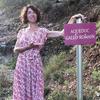
Dr Gül Sürmelihindi conducted the research project ‘AQUEA: Ancient Aqueduct Carbonate Deposits as a High-Resolution Archive for the Environment and Archaeology’ from 2021 to 2023, with Prof. Andrew Wilson and Dr Christopher Day (Dept of Earth Sciences) as mentors. She has since returned to a research post in Germany funded by the German Research Foundation (DFG).

Dr Andrés Teira-Brión conducted the research project 'MILLET: Old crops for new insights: agricultural systems of broomcorn and foxtail millet cultivation in Iberia' from 2022 to 2024, with Prof. Amy Bogaard as mentor. He went on to a role as archaeobotanist at Museum of London Archaeology (MOLA).

Dr Tingting Wang is a current Fellow, carrying out the project 'ARCHCROP: Crossing Paths: Millet, Wheat and Cultural Exchanges in the Inner Asian Mountain Corridor, China', with Dr Amy Styring and Prof. Amy Bogaard as mentors.

Dr Alexander Weide conducted the research project 'NICHE - Investigating the Ecology, Composition and Exploitability of Wild Cereal Habitats in Relation to Agricultural Origins in the Near East' from 2019 to 2021, with Prof. Amy Bogaard and Prof. Mike Charles as mentors. He went on to take up a Leverhulme Early Career Fellowship at the School of Archaeology.
NEWTON INTERNATIONAL FELLOWS:

Dr Teresa Fernandez-Crespo conducted research on 'Identity, Social Inequality and Violence in Late Neolithic/ Early Chalcolithic Southwest Europe' from 2018 to 2020, mentored by Prof Rick Schulting. Her project involved using sequential sampling of dentition to trace the early life histories of Late Neolithic to Bronze Age populations in north-central Spain. On completion of her Fellowship, she took up a Marie Skłodowska-Curie Fellowship at the Laboratoire Méditerranéen de Préhistoire Europe Afrique (LAMPEA) at Aix-Marseille University, and is currently a Senior Researcher at the University of Valladolid, Spain.
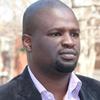
Dr Russell Kapumha undertook the research project 'On missing links and bridging gaps: The Archaeology of Kubiku, a Zimbabwe culture site in Masvingo, south eastern Zimbabwe' from 2021 to 2023, with Prof. Shadreck Chirikure as mentor. He is currently a Researcher on the ERC-funded New Bantu Mosaics project at the School (2024 onwards).
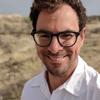
Dr Scott Blumenthal held a British Academy Newton International Fellowship here in 2015-17, for the project Oxygen isotopes in primates and implications for early hominin ecology, followed by a Postdoctoral Fellowship in the School 2017-18. Professor Julia Lee-Thorp acted as his mentor. He is currently Assistant Professor at the University of Oregon
--------------------------------------
JUNIOR RESEARCH FELLOWSHIPS AT OXFORD:
Other independent postdoctoral Fellowship opportunities at Oxford are Junior Research Fellowships, which are provided and hosted by Colleges. Recent and current Research Fellows working in the field of archaeology include:
Dr Tom Maltas (Career Development Fellow in European Archaeology at Keble College), is researching Agriculture and the Origins of Urbanism in Western Anatolia.


